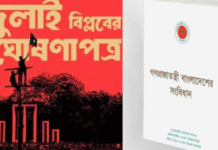TBS

Recently, the calls to ban the Jatiya Party as the facilitator of the Awami League in their authoritarian regime from 2009 to 2024 have gained much steam. It came to public attention after activists from Gono Odhikar Parishad, including the president Nurul Haque Nur, were beaten during a protest demanding the ban.
There have been incidents of attacks on the Jatiya Party office after 5 August. The latest attack came on 30 August, when the Jatiya Party office in Kakrail was vandalised and even set on fire. The situation prompted the Chief Advisor to hold talks. The protests highlight the widespread public resentment and the perception of the Jatiya Party as an obstacle to democratic reform.
The government’s response has been cautious, yet significant. In the wake of the demands, Bangladesh’s attorney general, Md Asaduzzaman, stated that the call for a ban on the Jatiya Party is “valid” and that he would “examine the legal grounds” for such an action.
This statement lends official credence to the protesters’ demands and indicates a potential shift in the political landscape where the Jatiya Party’s future is no longer secure, insinuating further knock-on impacts on the next election.
The most significant way the Jatiya Party enabled the AL’s authoritarian rule was by providing a political façade. Following the 2014 general election, which the primary opposition, the Bangladesh Nationalist Party (BNP), boycotted, the AL’s victory was not only a foregone conclusion but also lacked international credibility.
With the AL winning a landslide majority, the absence of a genuine opposition threatened to expose the government as a single-party entity. The Jatiya Party stepped into this void, agreeing to be the “official opposition” while simultaneously having its members in the cabinet. This unprecedented arrangement, often referred to as a “domestic opposition,” allowed the AL to claim that a vibrant, multi-party democracy was functioning, despite having no meaningful check on its power.
The events leading up to Bangladesh’s 2014 general election were marked by significant political turmoil, with the Jatiya Party, led by former military dictator Hussain Muhammad Ershad, playing a central and often confusing role. Jatiya Party’s participation became crucial for the AL to lend some semblance of legitimacy to the electoral process.
Initially, Ershad declared that his Jatiya Party would also boycott the election, aligning with the BNP’s demands. This created a political crisis for the ruling party. However, what followed was a series of dramatic events.
In a highly publicised move, Ershad was taken from his home by security forces and admitted to the Combined Military Hospital (CMH). The government claimed this was due to his deteriorating health, while critics alleged it was a form of house arrest designed to pressure him into reversing his decision. Indian Foreign Secretary Sujatha Singh met him, and Ershad and his party ultimately reversed course and decided to participate in the election.
The circumstances surrounding this reversal were highly suspicious and led to widespread speculation about external influence, particularly from neighbouring India. Following the election, which was boycotted by the BNP and saw the AL win a supermajority with 153 seats uncontested, the Jatiya Party became the official opposition.
This was an unprecedented situation where a party was both part of the government—with Ershad being appointed as a special envoy to the prime minister with the rank of a minister—and the official opposition at the same time, with his wife, Rawshan Ershad, serving as the Leader of the Opposition.
The political dynamic was replicated in the 12th parliamentary election on January 7, 2024. This time, the BNP and a larger coalition of opposition parties outright boycotted the polls, citing a lack of a neutral caretaker government and widespread political repression. With the major opposition alliance out of the race, the Awami League’s path to a fourth consecutive term was clear.
The Jatiya Party once again participated and emerged as the largest opposition party. However, its performance was significantly weaker than in the previous election, securing only 11 seats.
Now, due to such political moves, the Jatiya Party now faces a potential ban, like the Awami League. After the fall of Ershad in 1990, the party has always been used as a pawn in the wider electoral game. And their ban will likely affect the upcoming election in February 2026.
After the July Uprising, I travelled extensively across North Bengal, the region where the Jatiya Party had strongholds. Now, Jaamat is in a better position. They have a good network, and I heard from those areas that Jaamat may perform significantly better in those areas.
Dr Abdul Latif Masum, a former professor of government and politics at Jahangirnagar University, said, “Jatiya Party has lost its credibility and become a party detached from the people by aligning itself with Awami League. Now, there are talks about them rehabilitating the Awami League and influencing the politics. However, banning the party would have a negative impact on the global stage. They should be dealt with politically and socially. Banning them will not be a good decision in my opinion.”
Dr Mohammed Abdul Baten, Assistant Professor, Department of Political Science and Sociology, North South University, is of the same opinion.
“The word on the street is that the Jatiya Party may facilitate a comeback of the Awami League. The rumour may have some substance, but we must remember that some decisions can not be taken based on hypotheses and concerns. No matter what the perception about the party is on the street, the authorities need concrete evidence to ban a party. The best option is to let the people decide in the election whether they accept the party or give a verdict against it.”
In a hypothetical situation, if the Jatiya Party gets banned, who might be the biggest beneficiary in the next election? The unlikely beneficiary may be Jaamat-e-Islami. Historically, Jaamat has always performed worse than the Jatiya Party, but the July Uprising may have changed the equation.
“After the July Uprising, I travelled extensively across North Bengal, the region where the Jatiya Party had strongholds,” said Dr Masum. “Now, Jaamat is in a better position. They have a good network, and I heard from those areas that Jaamat may perform significantly better in those areas.”
Dr Baten is of the same opinion. “Having the Jatiya Party banned means one less stakeholder at the negotiations table. And, Jaamat and NCP will use the leverage to gain more on BNP before the election.”
“And Jatiya Party’s votes were mostly due to spatial emotion; like, Ershad is from Rangpur, so people there tended to have special emotion for him. Now, with the emotion gone, the votes are likely to go to the party with the better network—which happens to be Jaamat. Also, due to their religious messaging, Jaamat has a strong foothold in the impoverished regions of the North Bengal”, he concluded.
So, if the Jatiya Party is banned, Jaamat would have a better shot at becoming the second-largest party in the next election, which political analysts say would be a major achievement in itself, as the party has always been under scrutiny due to its role during the Bangladesh Liberation War in 1971.










It is al bs to be talking about this and that “What ifs”. History must be the ultimate judge. ON that basis, both the AL and Jatiya Party MUST be banned. There is a Bangla proverb, translated into english means “Adogs tail can never be straightened”. That is the truth. So, I believe anyone who is advocating the unbanning of these two parties are secretly AL party members themselves. There are many of them in the country. We do not need to heed them.